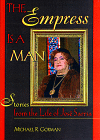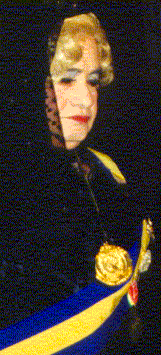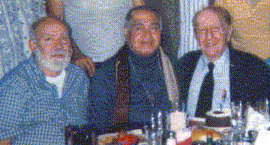 |

|
|
Jesse Monteagudo's Book Nook By Michael R. Gorman |
| |
| The Empress is a Man: Stories from the Life of Josť Sarria, by Michael R. Gorman; The Haworth Press; 278 pages; $39.95 hardcover; $19.95 paperback.
Sarria's odyssey from San Francisco love child to Dowager Empress is told in The Empress is a Man: Stories from the Life of Josť Sarria. Considering Sarria's contribution to gay bar culture, female impersonation, and San Francisco politics, we are amazed that no one has bothered to write a book about Sarria until now. Even Michael Gorman, when he first approached the Empress about an interview, had nothing more in mind than an article for a gay publication. However, as one lively conversation led to another, Gorman realized that here was material for a full-length biography. Though The Empress is a Man is published by the Haworth Press, a scholarly publisher, it is by no means a "scholarly" tome. There's hardly any scholarship to speak of: with very few exceptions, all of the information in this book came from Sarria's recollection, organized by the author after months of conversations with the Empress. As primary source material, Sarria is a biographer's nightmare, constantly changing the topic, rambling on, and occasionally forgetting himself. It was Gorman's task to take the raw material of Sarria's memory and turning it into a connected narrative. Though Gorman himself rambles on at times - as when he writes about his life - on the whole he keeps the story in tidy chronological order. San Francisco is a city of great eccentrics. Where else can a man like Joshua Norton proclaim himself "Emperor of North America and Protector of Mexico" and get away with it? When it was time for Sarria to become "Her Royal Majesty, Empress Josť the First," it was only natural to add the title "the Widow Norton" in memory of the 19th Century personality. Every year the Dowager Empress holds a (catered) memorial service at Norton's grave side for "her beloved husband" and, by extension, for those members of the Imperial Court who died of AIDS or other causes. To many of us the Imperial Court System - "a kind of Shriner's Club for drag queens" - seems quaint, if not outright reactionary. We forget that the System serves as a consciousness raiser and a fund raiser for gay, AIDS and other causes. Certainly if anyone deserves to be treated like royalty, it would be Josť Sarria. At a time when the Mattachine Society was oh-so respectable it was Sarria, bedecked like Bizet's Carmen, who would spoof Lilly Law's constant attempts to close down gay bars and repress gay sexuality and free expression. It was Sarria, in full drag, who would lead the employees and patrons of the Black Cat in a rousing chorus of "God Save Us Nelly Queens." It was Sarria who challenged San Francisco's archaic antidrag laws, which forbade a man from dressing in women's clothing "with the intent to deceive," by decking herself and other queens with signs that proclaimed "I am a boy."
The Empress Is a Man has all these and more. We meet Sarria's formidable mother, Dolores, who forsook personal happiness to raise her child. We meet his great love, Jimmy Moore, a Black Cat bartender who could not control his fondness for the bottle. We learn about Sarria's World War II experiences, cavorting with "the Boys from Texas" and with his "squad" of liberated Russian women. And we learn about Sarria's historic campaign for San Francisco's Board of Supervisors, which still amazes us 37 years later. And did I mention the tales out of the Imperial Court? The Empress Is a Man has all this and more. In one of his creative writing classes at Cosumnes River College in Sacramento, a student asked Michael Gorman "What is it about gay men and The Wizard of Oz?" "That's easy," Gorman replied. "Most of us little gay boys felt as if we were growing up in black-and-white Kansas, when what we really wanted was to live in that Technicolor place where people wear funny hats and pink taffeta and burst into song and dance whenever they wanted without anyone thinking it was weird or sissy." Some of us, Gorman might have added, can and do create our own Oz. One of these is undoubtedly Josť Sarria. San Francisco is the Emerald City, and Sarria is Dorothy, the Wizard and Glenda the Good Witch all rolled up into one. Still vibrant at 76, Sarria teaches us with his lifetime of experience and service. Read The Empress is a Man and you might learn something. |
© 1997-98 BEI
 Josť Sarria is one of our community's most intriguing personalities.
Born in San Francisco (1922), the illegitimate son of a Spanish Colombian
mother and a Nicaraguan father, Sarria was gay and proud at a time when most
gay men were cowering in their closets.
As the '50s "Nightingale of
Montgomery Street", Sarria was the camp drag star of the Black Cat Cafe,
where her operatic parodies were the talk of the town. In 1961 Sarria was
the first openly gay person to run for San Francisco's Board of Supervisors,
winning 7,000 votes in a crowded field of candidates.
Josť Sarria is one of our community's most intriguing personalities.
Born in San Francisco (1922), the illegitimate son of a Spanish Colombian
mother and a Nicaraguan father, Sarria was gay and proud at a time when most
gay men were cowering in their closets.
As the '50s "Nightingale of
Montgomery Street", Sarria was the camp drag star of the Black Cat Cafe,
where her operatic parodies were the talk of the town. In 1961 Sarria was
the first openly gay person to run for San Francisco's Board of Supervisors,
winning 7,000 votes in a crowded field of candidates.
 In 1964 Sarria, after
years as the undisputed queen of San Francisco, became the Empress Josť I,
inaugurating an Imperial Court System that holds sway over the City's gay
and drag society till this very day.
In 1964 Sarria, after
years as the undisputed queen of San Francisco, became the Empress Josť I,
inaugurating an Imperial Court System that holds sway over the City's gay
and drag society till this very day.
 Josť Sarria (center) with the late Ernie Potvin (left), Puerto Rico's pioneer, and Frank Kameny celebrating Kameny's 73rd birthday, Los Angeles, May 21, 1998. (Photo: GayToday)
Josť Sarria (center) with the late Ernie Potvin (left), Puerto Rico's pioneer, and Frank Kameny celebrating Kameny's 73rd birthday, Los Angeles, May 21, 1998. (Photo: GayToday)